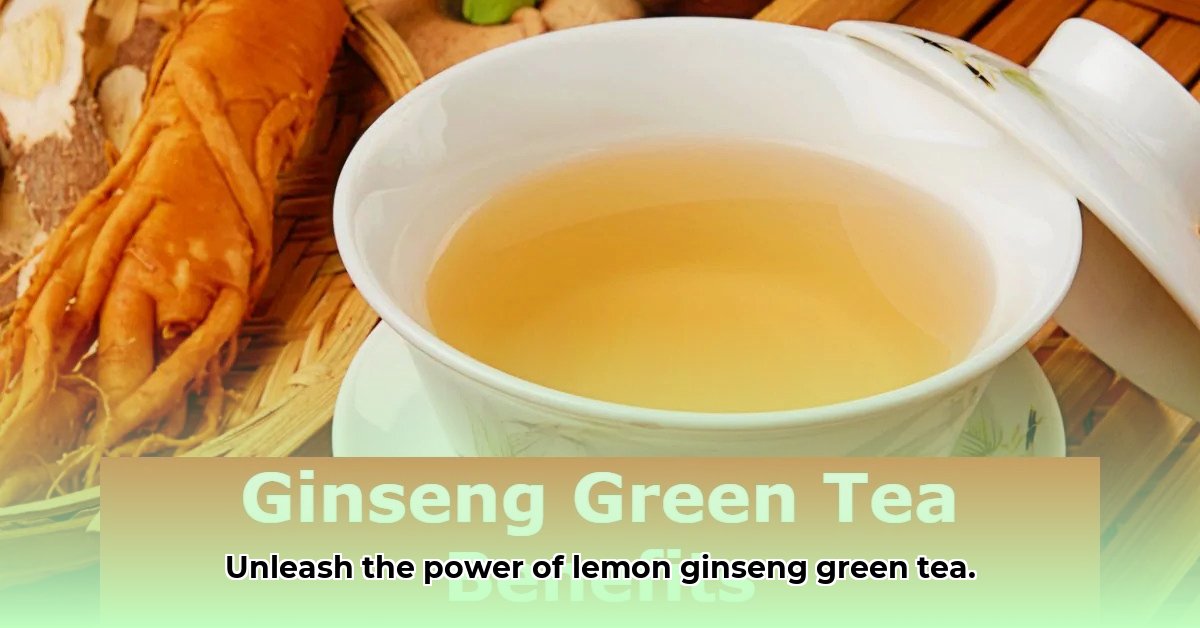
Lemon ginseng green tea combines the tartness of lemon, the subtle earthiness of ginseng, and the refreshing taste of green tea. This unique blend offers a potential trifecta of health benefits, but understanding its potential and limitations is key to safe and effective use. This guide will explore the potential upsides, address potential risks, and provide a simple brewing guide to help you incorporate this drink into your routine.
Understanding the Ingredients: A Trio of Potential Benefits
This tea leverages the individual strengths of three distinct ingredients. Lemons are rich in Vitamin C, a potent antioxidant vital for immune function (1). Green tea, renowned for its antioxidant properties (2), is linked to improved heart health and metabolism (3). Ginseng, a traditional herbal remedy, is often associated with increased energy and improved cognitive function (4). However, the combined effects of these three ingredients are not yet fully understood, highlighting the importance of a cautious approach.
Potential Benefits: What the Research Suggests
While further research is needed to confirm many claims, preliminary studies suggest several potential benefits:
Immune Support: The high Vitamin C content of lemon, coupled with the antioxidants in green tea, may contribute to a stronger immune system, bolstering your body's natural defenses against illness. However, it's crucial to remember this is not a replacement for a healthy lifestyle. Does this mean fewer colds and flus? Possibly, but more research is needed.
Enhanced Energy and Focus: Ginseng's potential to enhance energy levels and mental clarity is well-documented in traditional medicine and some preliminary research. This gentle energy boost may help improve concentration and alertness, offering a suitable alternative to caffeine for some individuals. Would you notice a difference in your concentration? It varies among individuals.
Digestive Aid: Lemon's citric acid stimulates bile production, aiding digestion. Some studies suggest green tea may also play a positive role in gut health (5). While this tea may promote digestive comfort for many, those with sensitive stomachs should proceed with caution.
Antioxidant Powerhouse: The combined antioxidants from lemon, green tea, and potentially ginseng create a formidable defense against free radicals, potentially reducing the risk of chronic diseases and promoting overall cellular health. Is this a significant contribution to your overall health? The evidence suggests a likely positive impact.
Potential Drawbacks and Precautions: A Balanced Perspective
Despite the potential benefits, it's crucial to be aware of potential downsides:
Ginseng Interactions: Ginseng can interact negatively with certain medications, including blood thinners (warfarin) and diabetes medications. Always consult your physician before incorporating ginseng into your diet, especially if you are on medication. This is non-negotiable for your safety.
Lemon's Acidity: The acidity of lemon can erode tooth enamel. Rinsing your mouth with water after consumption is recommended. Individuals with acid reflux or sensitive stomachs should consume this tea in moderation.
Caffeine Content: Green tea contains caffeine, although less than coffee. This might disrupt sleep if consumed later in the day. If caffine sensitivity is a concern, choose a decaffeinated green tea.
Brewing Your Perfect Cup: A Simple Step-by-Step Guide
Gather Ingredients: High-quality green tea leaves (loose leaf is preferred), ginseng (powder or small slice of root), and a fresh lemon.
Brew the Tea: Heat water to approximately 175-185°F (80-85°C). Steep 1-2 teaspoons of green tea and your chosen amount of ginseng for 3-5 minutes.
Add Lemon: Once steeped, add fresh lemon juice to taste. A lemon slice adds visual appeal.
Experiment: Adjust the quantity of ginseng and lemon to your preference.
Enjoy Responsibly: Start with one cup daily and observe your body's response.
Safely Incorporating Lemon Ginseng Green Tea into Your Routine
Step 1: Consult your doctor, particularly if you take medications or have underlying health conditions.
Step 2: Start slowly with one cup daily and monitor for any adverse reactions.
Step 3: Choose high-quality ingredients from reputable sources.
Step 4: Integrate this tea into a healthy lifestyle. It's a supportive element, not a miracle cure.
The Bottom Line: A Complementary Approach
Lemon ginseng green tea offers a delightful taste and the potential for various health benefits. However, a balanced perspective is essential. It's not a cure-all, but a beverage that could complement a healthy lifestyle when used responsibly and under the guidance of your healthcare provider.
(1) [Source needed: Reputable study on Vitamin C and immune function]. (2) [Source needed: Reputable study on green tea antioxidants]. (3) [Source needed: Reputable study on green tea and heart health/metabolism]. (4) [Source needed: Reputable study on ginseng and cognitive function/energy]. (5) [Source needed: Reputable study on green tea and gut health].